Container Types
Standard Containers
Standard containers are also known as general purpose containers. They are closed containers, i.e. they are closed on all sides. These can fit most of your common needs. Standard containers are designed and constructed for transportation of general cargo on sea, rail and land. They are able to withstand extreme temperatures ranging from -40°c (-40°F) to 70°c (158°F) without affecting their strength and water-tightness. Standard containers are used for all types general cargo (dry cargo). High-cube containers are used for all types general cargo (dry cargo). However, they are particularly suitable for transporting light, voluminous cargoes and overheight cargoes up to a maximum of 2.70 m tall.
Standard containers are mainly used as 20′ and 40′ containers. containers with smaller dimensions are very seldom used. Indeed, the trend is towards even longer dimensions, e.g. 45′.
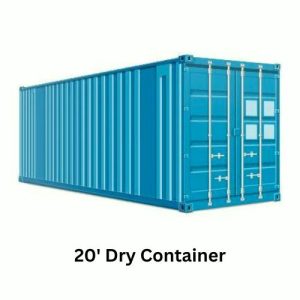
| Dimensions* | Length | Width | Height |
|---|---|---|---|
| External | 6096 mm | 2362 mm | 2590 mm |
| Internal | 5944 mm | 2337 mm | 2388 mm |
| Door Openings | 2337 mm | 2286 mm | |
| Weights* | Capacity* | ||
| Max. Gross* | Tare | Max. Payload | |
| 24000 kg | 2080 kg | 21920 kg | 33.9 cub.m |
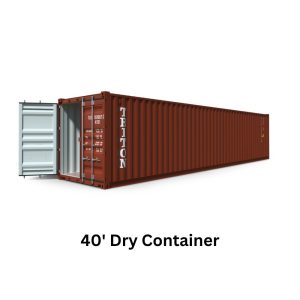
| Dimensions* | Length | Width | Height |
|---|---|---|---|
| External | 12192 mm | 2438 mm | 2591 mm |
| Internal | 12014 mm | 2286 mm | 2388 mm |
| Door Openings | 2337 mm | 2286 mm | |
| Weights* | Capacity* | ||
| Max. Gross* | Tare | Max. Payload | |
| 30480 kg | 3900 kg | 26580 kg | 67.7 cub.m |
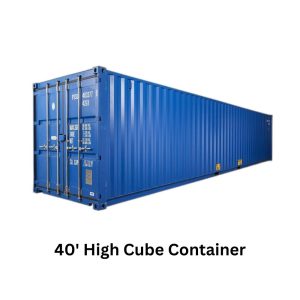
| Dimensions* | Length | Width | Height |
|---|---|---|---|
| External | 12192 mm | 2438 mm | 2896 mm |
| Internal | 11963 mm | 2362 mm | 2692 mm |
| Door Openings | 2286 mm | 2591 mm | |
| Weights* | Capacity* | ||
| Max. Gross* | Tare | Max. Payload | |
| 30480 kg | 4150 kg | 26330 kg | 76.4 cub.m |
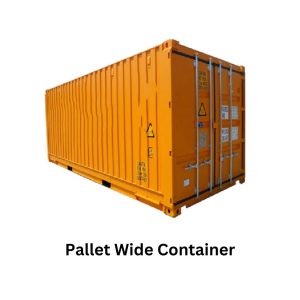
| Dimensions* | Length | Width | Height |
|---|---|---|---|
| External | 12192 mm | 2438 mm | 2591 mm |
| Internal | 12014 mm | 2286 mm | 2388 mm |
| Door Openings | 2337 mm | 2286 mm | |
| Weights* | Capacity* | ||
| Max. Gross* | Tare | Max. Payload | |
| 30480 kg | 3900 kg | 26580 kg | 67.7 cub.m |
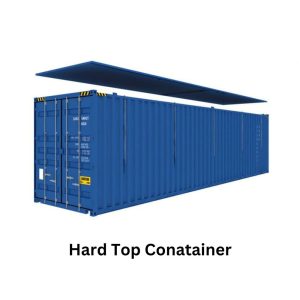
Hard top conatainer has two typical distinguishing structural features. On the one hand, it is equipped with a removable steel roof. In some types, this roof has points for accommodating forklift trucks, allowing the roof to be lifted by forklift truck. The roof weighs approx. 450 kg. In addition, the door header may be swivelled out. These two structural features greatly simplify the process of packing and unpacking the container. In particular, it is very easy to pack and unpack the container from above or through the doors by crane or crab when the roof is open and the door header is swivelled out. In the case of transport of an overheight cargo, the container roof may be left open and fastened directly to a side wall on the inside of the container. To do this, the roof only needs approx. 13 cm (5 1/8″) of space. Usual hard-top container dimensions are 20′ and 40′.
Hard-top containers are used for all types general cargo (dry cargo). Their principal uses are as follows:
-Heavy cargo
-Tall cargo
-Loading from above or through the doors by crane or crab
| Size | Heights* | Capacity* | Dimensions* | Length | Width | Height | ||
|---|---|---|---|---|---|---|---|---|
| Max. Gross | Tare | Max. Payload | ||||||
| 20' Hard Top Ctnr | 67200 kg | 2590 kg | 27890 kg | 32.8 cub.m | external | 6096 mm | 2362 mm | 2590 mm |
| internal | 5886 mm | 2342 mm | 2388 mm | |||||
| Door Openings | 2336 mm | 2276 mm | ||||||
| roof Openings | 5590 mm | 2208 mm | ||||||
| 40' Pallet Wide Ctnr | 30480 kg | 4700 kg | 25780 kg | 67.2 cub.m | external | 12192 mm | 2438 mm | 2591 mm |
| internal | 12020 mm | 2342 mm | 2388 mm | |||||
| Door Openings | 2336 mm | 2597 mm | ||||||
| Roof Openings | 11724 mm | 2208 mm | ||||||
| 40' Pallet Wide Ctnr | 30480 kg | 4900 kg | 25580 kg | 75.8 cub.m | External | 12192 mm | 2438 mm | 2896 mm |
| Internal | 12020 mm | 2342 mm | 2693 mm | |||||
| Door Openings | 2336 mm | 2597 mm | ||||||
| Roof Openings | 11724 mm | 2208 mm | ||||||
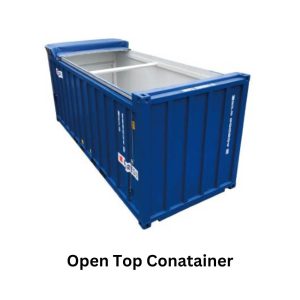
Open top container has the following typical distinguishing structural features: the roof consists of removable bows and a removable tarpaulin. The door header may be swivelled out. These two structural features greatly simplify the process of packing and unpacking the container. In particular, it is very easy to pack and unpack the container from above or through the doors by crane or crab when the roof is open and the door header is swivelled out. It should be noted, however, that the purpose of the roof bows of an open-top container is not solely to support the tarpaulin but also to contribute to container stability. Usual open-top container dimensions are 20′ and 40′.
Open-top containers are used for all types of general cargo (dry cargo). Their principal uses are as follows:
-Packing and unpacking from above or through the doors by crane or crab
-Tall cargo
| Size | Heights* | Capacity* | Dimensions* | Length | Width | Height | ||
|---|---|---|---|---|---|---|---|---|
| Max. Gross | Tare | Max. Payload | ||||||
| 20' Hard Top Ctnr | 30480 kg | 2350 kg | 28130 kg | 32.5 cub.m | external | 6096 mm | 2362 mm | 2590 mm |
| internal | 5888 mm | 2345 mm | 2365 mm | |||||
| Door Openings | 2335 mm | 2280 mm | ||||||
| Roof Openings | 5415 mm | 2205 mm | ||||||
| 40'Hard Top Ctnr | 30480 kg | 3850 kg | 26630 kg | 66.4 cub.m | external | 12192 mm | 2438 mm | 2591 mm |
| Internal | 12029 mm | 2342 mm | 2376 mm | |||||
| Door Openings | 2336 mm | 2230 mm | ||||||
| Roof Openings | 11544 mm | 2230 mm | ||||||
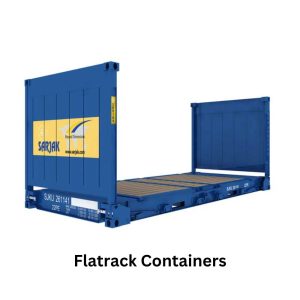
Flatracks consist of a floor structure with a high loading capacity composed of a steel frame and a softwood floor and two end walls, which may either be fixed or collapsible. The end walls are stable enough to allow cargo securing means to be attached and several flatracks to be stacked on top of one another. Flatracks are available in 20′ and 40′ sizes. Flatracks are mainly used to transportheavy-lifts and overheight or overwidthcargoes.
| Size | Heights* | Internal Dimensions* | ||||
|---|---|---|---|---|---|---|
| Max. Gross | Tare | Max. Payload | Length | Width | Height | |
| 20' Hard Top Ctnr | 34000 kg | 2740 kg | 31260 kg | 6038 mm | 2438 mm | 2213 mm |
| 20' Hard Top Ctnr | 30480 kg | 4200 kg | 26280 kg | 12086 mm | 2224 mm | 1981 mm |
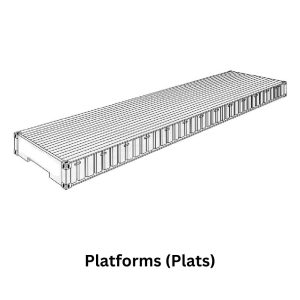
Platforms consist solely of a floor structure with extremely high loading capacity; they have no side or end walls. This high loading capacity makes it possible to concentrate heavy weights on small areas. A platform consists of a steel frame and a wooden floor structure. Platforms are available in 20′ and 40′ sizes. Platforms are used principally for oversized and very heavy cargoes.
| Size | Heights* | Internal Dimensions* | ||||
|---|---|---|---|---|---|---|
| Max. Gross | Tare | Max. Payload | Length | Width | Height | |
| 20' Hard Top Ctnr | 30480 kg | 2520 kg | 27960 kg | 6058 mm | 2438 mm | 370 mm |
| 20' Hard Top Ctnr | 45000 kg | 5700 kg | 39300 kg | 12192 mm | 2245 mm | 648 mm |
| 40' Hard Top Ctnr | 45000 kg | 5700 kg | 39300 kg | 12192 mm | 2245 mm | 648 mm |
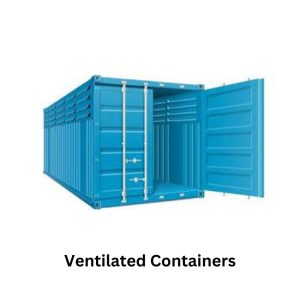
Ventilated containers are also known as passive (naturally) ventilated or coffee containers. Ventilation is provided by ventilation openings in the top and bottom side rails. The openings do not let in spray, to prevent depreciation of the cargo by rain or spray, for example. The common size for ventilated containers is 20′. Ventilated containers are used especially for cargoes which have to be ventilated in transit. One of the most significant of such commodities is green coffee beans, hence the name coffee container.
| Dimensions* | Length | Width | Height |
|---|---|---|---|
| External | 6068 mm | 2438 mm | 2591 mm |
| Internal | 5888 mm | 2325 mm | 2392 mm |
| Door Openings | 2334 mm | 2290 mm | |
| Weights* | Capacity* | ||
| Max. Gross* | Tare | Max. Payload | |
| 30480 kg | 2400 kg | 28080 kg | 33.0 cub.m |
Refridgirated and Insulated Containers
Refrigerated and insulated containers are mainly available as 20′ and 40′ containers. A distinction may be drawn between two different systems:
1. Integral Units(Integral Reefer Containers, Integrated Units)
This type of refrigerated container has an integral refrigeration unit for controlling the temperature inside the container. When being transported by ship, integral units have to be connected to the on-board power supply system. For transport by road and rail, most integral unit refrigeration units are operated by a generator set (genset). This may either be a component of the refrigeration unit or connected to the refrigeration unit. Refrigerated containers are used for goods which need to be transported at a constant temperature above or below freezing point. These goods are divided into chilled goods and frozen goods, depending on the specified transport temperature. They principally include fruit, vegetables, meat and dairy products, such as butter and cheese. High-cube integral units are used in particular for voluminous and light goods (e.g. fruit, flowers). Nowadays, goods requiring refrigeration are mostly transported in integral units, which have a markedly higher market share than porthole containers.
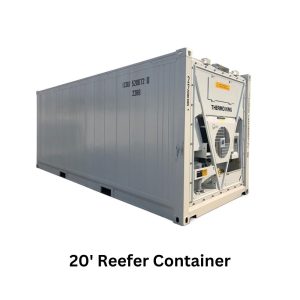
| Dimensions* | Length | Width | Height |
|---|---|---|---|
| External | 6096 mm | 2362 mm | 2590 mm |
| Internal | 5944 mm | 2337 mm | 2388 mm |
| Door Openings | 2337 mm | 2286 mm | |
| Weights* | Capacity* | ||
| Max. Gross* | Tare | Max. Payload | |
| 24000 kg | 2080 kg | 21920 kg | 33.9 cub.m |
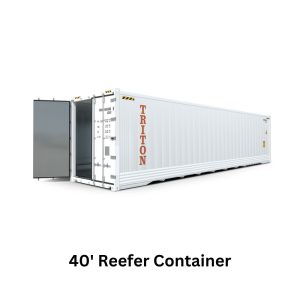
| Dimensions* | Length | Width | Height |
|---|---|---|---|
| External | 12192 mm | 2438 mm | 2591 mm |
| Internal | 12014 mm | 2286 mm | 2388 mm |
| Door Openings | 2337 mm | 2286 mm | |
| Weights* | Capacity* | ||
| Max. Gross* | Tare | Max. Payload | |
| 30480 kg | 3900 kg | 26580 kg | 67.7 cub.m |
| Dimensions* | Length | Width | Height |
|---|---|---|---|
| External | 6096 mm | 2362 mm | 2590 mm |
| Internal | 5944 mm | 2337 mm | 2388 mm |
| Door Openings | 2337 mm | 2286 mm | |
| Weights* | Capacity* | ||
| Max. Gross* | Tare | Max. Payload | |
| 24000 kg | 2080 kg | 21920 kg | 33.9 cub.m |
Integral Units(Integral Reefer Containers, Integrated Units)
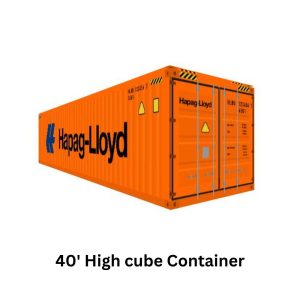
| Dimensions* | Length | Width | Height |
|---|---|---|---|
| External | 6096 mm | 2362 mm | 2590 mm |
| Internal | 5944 mm | 2337 mm | 2388 mm |
| Door Openings | 2337 mm | 2286 mm | |
| Weights* | Capacity* | ||
| Max. Gross* | Tare | Max. Payload | |
| 24000 kg | 2080 kg | 21920 kg | 33.9 cub.m |
2. Insulated Containers(Porthole Containers)
This type of container is often referred to not as a refrigerated container but as an insulated container, as it has no integ ral refrigeration unit. On board, the inside of the container is supplied with cold air via the ship’s central cooling plant. The air flows through the container in the same way as in integral units. cold air is blown in at the bottom and the “warm” air is removed at the top.
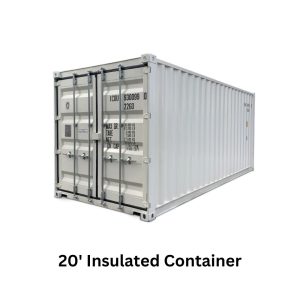
| Dimensions* | Length | Width | Height |
|---|---|---|---|
| External | 6096 mm | 2362 mm | 2590 mm |
| Internal | 5724 mm | 2286 mm | 2014 mm |
| Door Openings | 2286 | 2067 mm | |
| Weights* | Capacity* | ||
| Max. Gross* | Tare | Max. Payload | |
| 24000 kg | 255550 kg | 21450 kg | 26.4 cub.m |
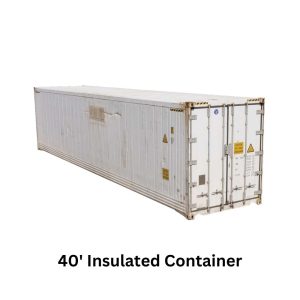
| Dimensions* | Length | Width | Height |
|---|---|---|---|
| External | 12192 mm | 2438 mm | 2591 mm |
| Internal | 11840 mm | 2286 mm | 2120 mm |
| Door Openings | 2286 mm | 2195 mm | |
| Weights* | Capacity* | ||
| Max. Gross* | Tare | Max. Payload | |
| 30480 kg | 3850 kg | 26630 kg | 60.6 cub.m |
Bulk Containers
Bulk (or bulk cargo) containers have three loading hatches in the roof, each of a diameter of approx. 455 mm (1 3/4′). The distance between the hatches (center to center) is 1.83 m (6′). On the door side, there are two discharge hatches, which are sometimes equipped with short discharge tubes for guiding the bulk cargo. Alternatively, two unloading hatches may be mounted in the doorways, for emptying the containers. Bulk containers are used in particular for transporting bulk cargo, such as grain, feedstuffs, spices. However, they may also be used for transporting general cargo.
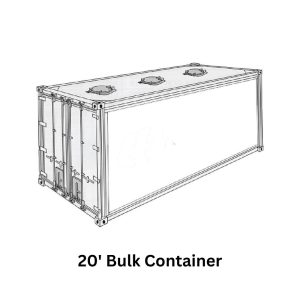
| Dimensions* | Length | Width | Height |
|---|---|---|---|
| External | 6096 mm | 2362 mm | 2590 mm |
| Internal | 5934 mm | 2358 mm | 2340 mm |
| Door Openings | 2335 mm | 2292 mm | |
| Weights* | Capacity* | ||
| Max. Gross* | Tare | Max. Payload | |
| 24000 kg | 2450 kg | 21550 kg | 32.9 cub.m |
Tank Containers
Tank containers are used for liquid cargoes, such as:
-Foodstuffs: fruit juices, spirits, sweet oils
-chemicals: hazardous materials, such as fuels, toxic substances, corrosion protection agents.
If the cargo requires temperature-controlled transport, tank containers can be equipped with insulation or heating.
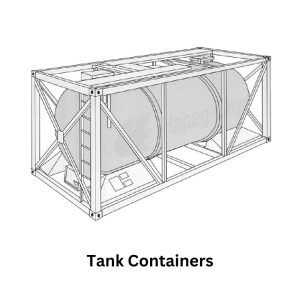
| External Dinensions To ISO* | ||
|---|---|---|
| Length | Width | Height |
| 6058 mm | 2438 mm | 2438 mm |
| Weights* | ||
| Max. Gross | Tare | Max. Payload |
| 30480 kg | 4190 kg | 26290 kg |